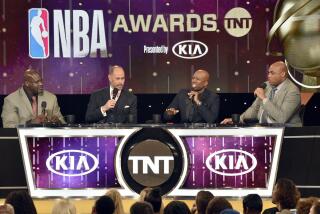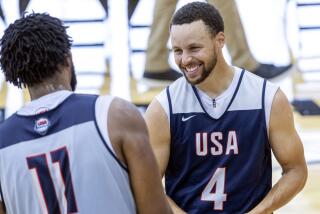They’re all protecting some hide
- Share via
Perhaps sensing that organized boycotts of Philadelphia 76ers, Charlotte Bobcats and Memphis Grizzlies games might be redundant, People for the Ethical Treatment of Animals (PETA) decided to strike back with sarcasm in the controversy over NBA basketballs.
Dan Shannon, PETA manager of campaigns, fired off a letter to the league proposing “a solution to the recent drama of a few high-profile NBA players who were whining about fingertip scratches and scrapes caused by the new composite basketball adopted by the league.
“As excruciating as these ‘injuries’ must be for a world-class athlete, thousands of cows stand to suffer far worse if the NBA goes back to a leather basketball -- so we’d like to suggest a compromise.
“PETA would like to offer a lifetime supply of cruelty-free hand cream to any NBA siss ... excuse me, superstar who’d be willing to give the composite ball another shot. Recreational players and NCAA athletes have been using composite balls for years without experiencing scratches or scrapes -- but we understand that the delicate hands of pampered NBA superstars are far more sensitive than those of your average Joe who actually has to work for a living.
“The hand cream comes in a variety of scents, including “Filthy Rich Organic” (perfect for any overpaid millionaire) and “Peaceful Patchouli” -- Nash, we have a whole case of that set aside for you.
“Maybe by taking care of your own skin a bit better, you can allow cows who would otherwise meet their end in the slaughterhouse to keep theirs.”
Shaq attack
Shannon’s letter singled out Shaquille O’Neal as “one of the players who has been most critical of the composite ball” and suggested he perhaps “volunteer to be our test case -- since you’ve only played four games all season, surely you have time to work a moisturizing routine into your schedule.” Shannon also called out LeBron James, noting that, “The NCAA has used the composite ball for years -- so it’s not only an education you missed out on. Maybe you just need some more time to adjust.”
Trivia time
The original game of basketball was played with a soccer ball, and the first designated basketballs were brown. Who came up with the modern-day orange basketball?
Two ideas that went flat
Will Spalding’s ill-fated new NBA composite ball be remembered as this decade’s New Coke?
“It’s really a disaster,” Robert Tuchman, president of New York-based consulting firm TSE Sports & Entertainment, told the Toronto Globe and Mail. “I wouldn’t put it on the same page as the New Coke fiasco, but it really is an unfortunate situation. It’s like an endorsement gone wrong.”
Tuchman said the timing of the NBA’s decision to go back to the old leather basketball would hurt sales for Spalding.
“Not only is it 13 days before Christmas, but they had the entire NBA season they were counting on ... and also the millions of dollars they put behind the marketing of the basketball,” he said.
Peter Sealey, a Bay Area marketing consultant, was a Coca-Cola executive during the days when the company introduced New Coke. Speaking about the NBA basketball controversy, Sealey said, “It seems to me any time there is a major change in the key elements of a game, for the future, everything good and bad will be blamed on the change.
“It began with night baseball and will continue with this.”
They’re on their own
It appears PETA’s protests will not be able to stop the slaughtering of cows for the benefit of user-friendly NBA basketballs, but who’s going to stop the Bulls from getting killed in the playoffs?
Trivia answer
Citing the brown basketball’s lack of visibility to both players and fans, Butler University coach Tony Hinkle in the late 1950s developed the orange basketball that is still used today.
And finally
Charles Barkley of TNT, on the Miami Heat’s lineup without the injured O’Neal: “They’re a bunch of Tito Jacksons without Shaq. Except for Wade -- he’s Janet, he can survive on his own.”
More to Read
Go beyond the scoreboard
Get the latest on L.A.'s teams in the daily Sports Report newsletter.
You may occasionally receive promotional content from the Los Angeles Times.










